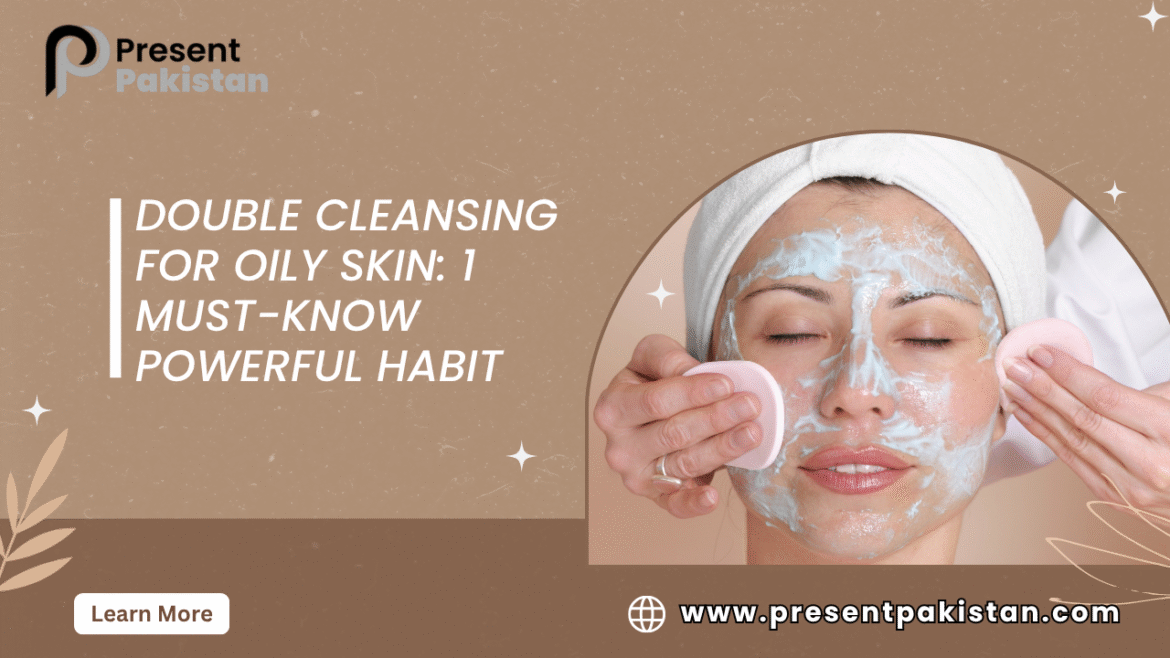Double cleansing for oily skin isn’t only another trend in skincare: it’s a method supported by dermatologists to harmonize oil production, forestall breakouts, and wash away deep-seated impurities. Whether you’re an oily-skinned person who fights with acne, excess shine, or congested pores, this routine will revolutionize your skincare routine.
This two-step process is a simple one: An oil-based cleaner First, followed by a Water based cleaner. The reason? To strip oil-soluble impurities like sunscreen and make-up, and then address water-based impurities like sweat and grime.
We delve into the benefits of double cleansing for oily skin, how to get it right, and the science behind the glowing benefits in this guide.
Begin doubling up on cleansing and learn additional morning skin care tips, evening skin care routines, and oily skin acne prevention tips.
Table of Contents
- What is double cleaning?
- Why does oily skin need double cleansing?
- A Complete Guide to Double Cleaning Having Oily Skin
- Common mistakes and how to avoid them.
- Best Products for Double Cleansing (Budget + Premium)
- Morning vs Night: When to Double Cleanse
- Dermatologist’s opinion and science
- Debunking myths about double cleansing
- Frequently Asked Questions About Double Cleansing for Oily Skin
- People also ask.
- The result
1. What is double cleaning?
Double cleansing is a two-step facial cleansing method popularized by K-beauty. The first step involves using an oil-based cleanser to dissolve oil-based impurities (makeup, sebum, SPF). The second step uses a water-based cleanser to remove sweat, dirt, and environmental pollution.
This method ensures that your skin is completely clean without the necessary moisture.
Important Points:
- Step 1: An oil cleanser removes oil-based impurities.
- Step 2: The Water purifier removes sweat, dirt, and debris.
2. Why Oily Skin Needs Double Cleansing
Applying oil to oily skin may seem counterintuitive, but “as it dissolves” is the scientific principle. Oil-based cleansers bond with excess sebum and dissolve impurities that water-based cleansers cannot.
Without this method, oily skin is often congested, leading to blackheads, acne, and enlarged pores.
“Double cleansing is essential for oily skin because it helps maintain a clean environment while maintaining the integrity of the skin barrier.” Dr. Mona Gohra, Dermatologist
Important Points:
- Prevents pore blockage and acne breakouts.
- Regulates oil production without over-drying.
3. A Complete Guide to Double Cleaning Having Oily Skin
Step 1: As a first step, massage a small amount of spilled squalane or jojoba oil onto dry skin. Make sure to massage for a minute to lift up the makeup, sunscreen, and oil residue.
Step 2: The oil cleanser can now be rinsed off with warm water. This helps removing any residual dirt.
Step 3: Put on a water based cleanser of preference foam or gel. While it’s damp, massage it onto the face. As with the other steps, give it 30 to 60 seconds for deeper residue and further pore cleansing.
Step 4: After completing the masks, warm water rinsing for the last time helps. Pat the face dry with a clean towel after.
Pro tip: The use of cold water will not help with cleansing the skin. Lukewarm or slightly warm water is best. Cleansing deeply with hot water is good for breaking down oil, but can be too damaging if overly hot.
Important Points:
- Always use an oil cleanser on dry skin.
- Apply a gentle, sulfate-free, water-based cleanser afterwards.
4. Common mistakes and how to avoid them.
Many users make these critical mistakes:
- Use makeup wipes instead of oil cleansers.
- Skipping other cleansers
- Using a harsh foaming cleanser with alcohol
- Excessive cleaning (more than twice a day)
Solution: Stick to gentle, non-greasy products and follow up with a moisturizer.
Important Points:
- Avoid stripping ingredients such as alcohol or sulfates.
- Do not overwash your face; Twice daily is ideal.
5. Best Products for Double Cleansing (Budget + Premium)
| category | Oil cleaner | Water-based cleansers |
| Budget | Simple Hydrating Cleansing Oil | CeraVe Foaming Cleanser |
| Mid-range | Face Shop Rice Water Bright | La Roche-Posay Effaclar Gel |
| Premium | DHC Deep Cleansing Oil | Fresh Soy Face Cleanser |
Important Points:
- Use labeled products. Unfunny And Oil free (for other cleansers).
- Do a patch test before using any new products.
6. Morning vs Night: When to Double Cleanse
You should double cleanse. Only at night. Morning cleansing can only be done with a mild water-based cleanser to avoid disrupting the skin’s natural oils.
Nighttime is when you remove makeup, pollution, and excess sebum that accumulates throughout the day.
Important Points:
- Double cleansing at night removes deep dirt and impurities.
- In the morning, a gentle single cleansing is sufficient.
7. Dermatologists’ opinion and science
2020 Research in the Journal of Cosmetic Dermatology discovered that double cleansing significantly reduces acne bacteria and improves skin texture.
“Regular double cleansing reduces excess sebum without impairing skin barrier function.” – JCD study
World dermatologists all agree. Especially great for oily and acne-prone skin.
Key Points:
- Scientifically proven and accepted by dermatologists.
- Cleans and maintains the skin pH-balanced and protected.
8. Dispelling myths about double cleansing
Myth 1: Oily skin does not need oil.
The truth: Natural oils help dissolve excess sebum.
Legend 2: It causes more dryness.
The truth: Only hard products do this. Use a mild cleanser.
Legend 3: This is only for people who wear makeup.
The truth: Everyone is exposed to sunscreen, dust, and pollution.
Important Points:
- Oil in skincare ≠ oily skin.
- Double cleansing is essential even if you are makeup-free.
9. Most Frequently Asked Questions on Double Cleansing with Oily Skin
Q1. Is double cleansing suitable for oily acne skin?
Yes, as it makes it easier to cleanse out dirt and unclog pores, thereby minimizing breakouts.
Q2. Can I double cleanse daily?
Yes, but at night only. In the morning, use a gentler cleanser.
Q3. What oils are ideal for oily skin?
Use cleansers that contain jojoba, grapeseed, or squalene oil.
Q4. Does double cleansing displace sunscreen?
Yes, it strips away both chemical and physical sunscreen residue.
Q5. Will it oil up my skin?
No, properly done, it actually regulates excess oil.
10. People also ask.
What happens if I omit double cleansing with oily skin?
If you omit double cleansing, oily impurities such as makeup, sunscreen, and pollution remain on the skin. This clogs pores, increases sebum, and increases the likelihood of acne. After a while, your skincare ingredients also lose efficacy due to residual buildup.
Is micellar water sufficient for oily skin?
Micellar water is mild but not sufficient for oily skin or acne-prone skin with heavy makeup or sunscreen. It does not have the strong cleaning ability of oil cleansers and fails to fully emulsify sebum. To get optimal results, use micellar water in conjunction with a gel cleanser or a full double cleanse.
Can double cleansing control oil?
Yes, double cleansing depletes excess oil and balances skin pH without drying it out. It gets your skin back in balance, so it is less reactive and makes up for it with more oil. Your skin will become less oily and look healthier over time.
Is coconut oil a good cleanser for oily skin?
No, coconut oil is comedogenic and will clog pores on oily or acne-prone skin. Instead, use mild, non-comedogenic oils like squalene or jojoba. Always use cleansers designed for your skin type.
Conclusion: Say hello to double cleanses and farewell to shine.
Double cleaning oily skin is not a trend: it’s an investment in your skin that clears residue, balances oil, and promotes healthy-looking skin.
If you’re tired of fighting oil, acne, and pale skin, it’s time to add this amazing habit to your evening routine. Combine this with proper skincare, and you’ll see noticeable changes in weeks.
Ready to boost your skincare?
Learn carefully curated skincare knowledge and top acne prevention tips for oily skin, top serums for night glow, and skin barrier repair routines.







